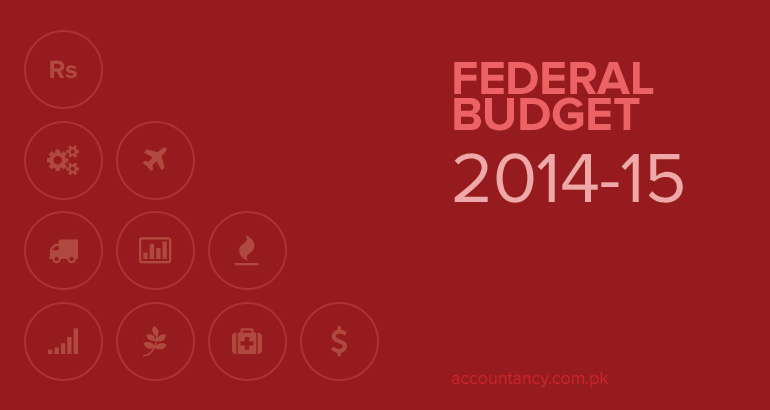
ISLAMABAD (June 04, 2014) – The federal budget for the year 2014-15, with a total outlay of Rs3.945 trillion, was approved by the federal cabinet on Tuesday.
In his budget speech in parliament, finance minister Ishaq Dar told the house that Rs525 billion have been allotted for the Public Sector Development Programme (PSDP), a 24 percent increase from last year.
He said that it is the aim of the government to bring the budget deficit down to 4.9 percent from last year’s 5.8 percent.
Budget spending has been set at Rs3.8 trillion while Rs3.94 trillion are estimated to be collected as tax revenues in the coming fiscal year. Out of this revenue, Rs1.72 trillion will be the share of the provincial governments.
Dar said that foreign reserves now stood at USD13.5 billion which the federal government aims to increase USD 15 billion in the near future. Exports have increased by 4.4 percent in the last year. The Pakistani rupee, which has depreciated substantially in the past few years, appreciated by 11%. The economy grew by 4.14 percent and industrial growth reached 5.84% in previous year.
These indicators, according to Dar, are signs of an economy which is stabilizing.
Brief Highlights of the Federal Budget
- Interest payments on loans and borrowings form the largest portion of current expenditure which amount to Rs1,325 billion.
- Rs700 billion have been allocated for defense expenditure.
- Rs27 billion have been allocated for health with highest priority being given to Polio eradication.
- A combine outlay of Rs63 billion will be made for higher education, a 10 percent increase from last year.
- To counter the crippling power crisis, the government will invest Rs205 billion in multiple power projects in the next fiscal year. Rs15 billion have been allocated for the construction of Diamer-Basha dam. The government seeks USD700 million for Dasu Dam from the World Bank in this regards.
- Corporate tax rate is to be reduced by 1 percent to 33 percent which will improve corporate bottom lines and will provide them an incentive to invest more.
- It has also been proposed that corporate tax rate be reduced to 20 percent if the investment is in a new industrial undertaking or a construction or housing project set up June 30, 2017, provided 50 percent of the total project cost is in the form of equity through foreign direct investment (FDI).
- Finance minister announced that SBP mark-up rate for exports refinance scheme is to be reduced from 9.4 percent to 7.5 percent, which will reduce the financial cost of exporters by approximately 2 percent.
- FED on telecommunications has been reduced 1 per cent from 19.5 percent to 18.5 percent.
- Finance minister has said that mark-up rate on exports finance is to be reduced from 9.4 percent to 7.5 percent, which will reduce the financial cost of exporters by 2 percent.
- Maximum custom duty has been reduced to 25 percent from previous year’s 30 percent. Previously exempted non-socially sensitive imports (food items, petroleum products, fertilizers etc.) will be charged 1 percent custom duty.
- Duty-free import of textile machinery will be allowed for two more years.
- The ministry of Finance has proposed to withdraw 10 percent excise duty on locally made 1800cc cars.
- SBP has increased the overall credit available to agricultural sector to Rs500 billion for the next fiscal year.
- The federal budget proposes 5 percent additional tax for those who did not submit their tax returns last year.
- Finance minister informed the house that CGT (Capital Gains Tax) rate will be 12.5 percent for securities held up to 12 months and 10 percent for 12-24 month securities. Securities held for longer periods shall be exempt from CGT.
- The budget proposes that 1 percent adjustable advance tax be collected on purchase of immovable property. This rate is 2 percent for non-compliant taxpayers. Capital gains tax on sale of immovable property is also to be increased from 0.5 percent to 1 percent for
- Finance minister claimed that tax collection is up by 16.4%. He said that the federal government aims to increase the Tax to GDP ratio to 13 percent by 2016-17 from the current 10.1 percent. To achieve this target, one of federal government’s plans is to bring the country’s burgeoning yet largely undocumented retail sector into the tax net in the next fiscal.
- A proposal has been submitted by finance ministry to link the utility bills of retailers with their National Tax Numbers (NTN) which would enable the government to trace the tax record of the retailers. All new retailers will also have to obtain the NTN for paying their utility bills.
- The federal minister announced that no new taxes are being imposed in sales tax and federal excise regimes, however sales tax regime for retailers is being reformed into two tiers. In the first tier, large-sized national and multinational retailers with monthly electricity bills in excess of Rs50,000 will pay sales tax in the normal regime, whereas the remaining retailers will be charged sales tax on retail sales through their electricity bills at the rates of 5 percent and 7.5 percent respectively.
- Dar said that minimum wages rate has been raised to Rs11,000. A 10 percent advance release will be allowed to government employees in grades 1-15 drawing fixed medical allowance of Rs1,000 per month.


